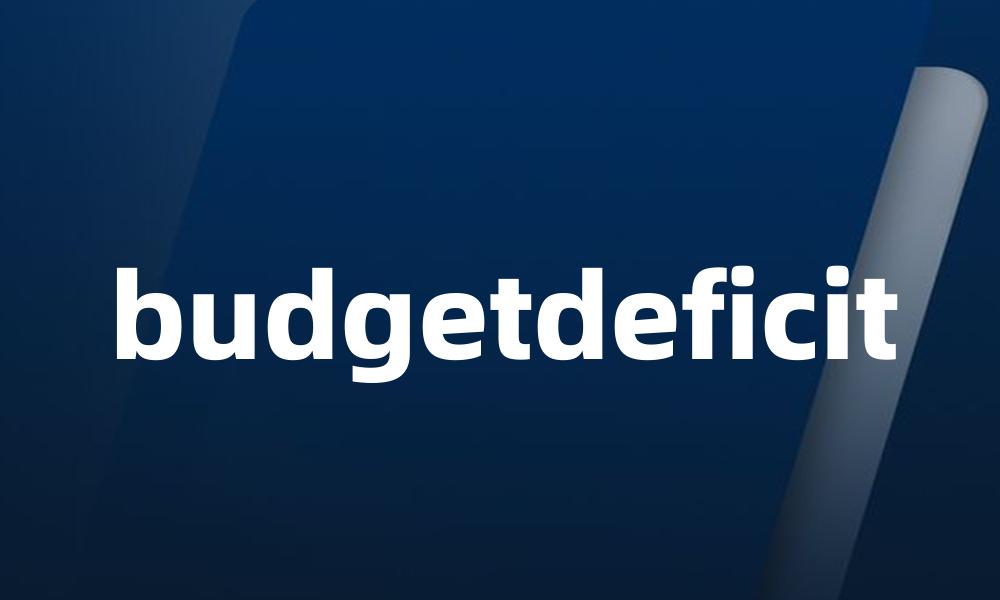
budgetdeficit
形容词: 1. 财政赤字的(financially in deficit)例句: - The government is facing a budget deficit due to overspending.(由于超支,政府面临财政赤字。) - The company's budget deficit has been increasing steadily over the past few years.(公司的财政赤字在过去几年稳步增长。) 名词: 1. 预算赤字(an excess of expenditures over revenues)
2. 财政赤字(a situation in which the government's spending exceeds its income)
例句: - The country's budget deficit is expected to reach record levels this year.(预计该国的预算赤字今年将达到创纪录的水平。) - The government has implemented measures to reduce the budget deficit.(政府已采取措施减少财政赤字。)
词语辨析
- budget deficit vs. trade deficit: - budget deficit: 财政赤字,指政府支出超过收入的情况。 - trade deficit: 贸易逆差,指进口大于出口的情况。 - budget deficit vs. budget surplus: - budget deficit: 预算赤字,指支出超过收入的情况。 - budget surplus: 预算盈余,指收入超过支出的情况。词汇扩充
- fiscal deficit: 财政赤字 - revenue shortfall: 收入缺口 - deficit spending: 赤字开支 - deficit reduction: 赤字减少近义词
- shortfall - deficit反义词
- surplus柯林斯词典
- budget deficit (noun): a situation in which a government spends more money than it receives in taxes and other income.(财政赤字)牛津词典
- budget deficit (noun): an excess of expenditure or liabilities over income or assets in a given period.(预算赤字)例句
- The country is facing a budget deficit for the third consecutive year.(这个国家连续第三年面临预算赤字。)
- The government needs to address the budget deficit in order to stabilize the economy.(政府需要解决预算赤字问题,以稳定经济。)
- The budget deficit has put pressure on public services, leading to cuts in education and healthcare.(预算赤字给公共服务带来了压力,导致教育和医疗保健方面的削减。)
- The finance minister announced measures to reduce the budget deficit and stimulate economic growth.(财政部长宣布了减少预算赤字和刺激经济增长的措施。)
- The budget deficit has widened due to increased government spending on infrastructure projects.(由于政府在基础设施项目上的增加支出,预算赤字扩大了。)
- The opposition party blamed the government for the budget deficit, accusing them of mismanagement of public funds.(反对党指责政府造成预算赤字,指责他们对公共资金的管理不善。)
- The budget deficit is expected to impact the country's credit rating and borrowing costs.(预计预算赤字将影响该国的信用评级和借款成本。)
- The government is considering raising taxes to address the budget deficit.(政府正在考虑提高税收以解决预算赤字问题。)
- The finance ministry has proposed austerity measures to reduce the budget deficit.(财政部提出了紧缩措施以减少预算赤字。)
- The budget deficit has led to a decrease in public investment and infrastructure development.(预算赤字导致公共投资和基础设施建设的减少。)
- The government is under pressure to find ways to reduce the budget deficit without compromising essential services.(政府面临压力,要找到减少预算赤字的方法,而不影响基本服务。)
- The budget deficit is a major concern for economists and policymakers.(预算赤字是经济学家和决策者的主要关注问题。)
- The opposition party has proposed alternative solutions to address the budget deficit.(反对党提出了解决预算赤字的替代方案。)
- The government's failure to control the budget deficit has resulted in a loss of investor confidence.(政府未能控制预算赤字,导致投资者信心丧失。)
- The budget deficit has forced the government to cut funding for social welfare programs.(预算赤字迫使政府削减社会福利项目的资金。)
- The budget deficit is projected to increase in the next fiscal year if measures are not taken to reduce spending.(如果不采取措施减少支出,预计下一个财政年度的预算赤字将增加。)
- The finance minister presented a plan to address the budget deficit during the parliamentary session.(财政部长在议会会议上提出了解决预算赤字的计划。)
- The budget deficit has resulted in a decrease in public investment and economic growth.(预算赤字导致公共投资和经济增长的减少。)
- The government aims to reduce the budget deficit by increasing tax revenues and cutting unnecessary expenses.(政府通过增加税收收入和削减不必要的开支来减少预算赤字。)
- The budget deficit has forced the government to borrow money from international lenders to cover its expenses.(预算赤字迫使政府向国际借贷机构借款以支付开支。)

 小皮
小皮